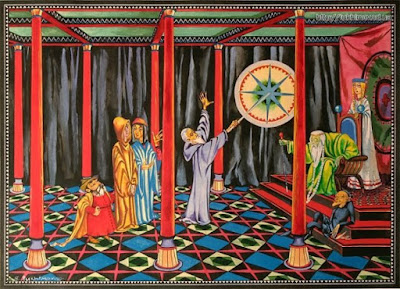As the game begins, players are given a communal sheet with some questions and some milestones.
This set of questions can be answered at anytime to turn a failed roll into a max result. The answer must relate to the problem you are facing somehow; and can be spent to change the roll of an ally too, if the question allows it. Example: "What was that important lesson you received from your master?" can be used for yourself or for any other PC if you are willing to consider him a master, or if you yell that lesson aloud so you can inspire that character.
You can only answer about YOUR character past, and if there are players who have answered less questions than you, you must wait for them to catch up so everybody can use this. You can interpret the questions however you like. If your character is not even a martial artist, you can say that his photography classes were his dojo, or something like that.
Once a question is answered, it can't be used again by any other player. These mechanic gives the PCs some plot armor during the early game, and the answers help the GM to picture the world the players have in mind, and to bring back the past of the characters into the plot.
_ What was that important lesson you received from your master?
_ What is the emblem/motto of your dojo? And when you get some time, what is the story behind it?
_ Why must your troubled ally not give up?
_ What did you do to earn your living in the past?
_ What promise did you made and to who?
_ How brutal was your training? like, what is the most fucked up shit you did?
_ What made you undertake your training at all?
_ What thing or person do you despise most?
_ What have you always be ashamed of, but might be useful now?
_ What dream burns in your head / what passion burns in your heart?
This set of milestones can be checked at the end of each session by each PC: If you managed to do at least one of them, write yout initial on it and advance. If you did many of those during the session, you must choose only one. You cannot mark a milestone twice, but you can get liberal about their meaning. Your GM has the final word, as always. Different PCs can mark the same milestone if they want to.
_ I've helped an NPC with his first world problem
_ I've passed a master's test and endured his training
_ I've found some treasure that is beyond mere gold
_ I've defeated somebody in an honorable duel
_ I've fought an infernal beast
_ I've solved a crime
_ I've stood for my beliefs even when it was risky to do so
_ I've mantained the honor of my dojo
_ I've funded a dojo and taught some students
_ I've righted a wrong the best I could
_ I've performed my profession to make a great work
_ I've made an even greater work
_ I've retrieved big treasure
_ I've retrieved an even bigger treasure
I will probably edit when I come up with better options








